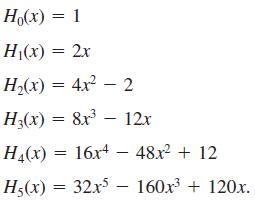Question: (a) When = n is a nonnegative integer, Hermites differential equation always possesses a polynomial solution of degree n. Use y 1 (x), given
(a) When α = n is a nonnegative integer, Hermite’s differential equation always possesses a polynomial solution of degree n. Use y1(x), given in Problem 51, to find polynomial solutions for n = 0, n = 2, and n = 4.
Then use y2(x) to find polynomial solutions for n = 1, n = 3, and n = 5.
(b) A Hermite polynomial Hn(x) is defined to be the nth degree polynomial solution of Hermite’s equation multiplied by an appropriate constant so that the coefficient of xn in Hn(x) is 2n. Use the polynomial solutions in part (a) to show that the first six Hermite polynomials are

H(x) = 1 H(x) = 2x .() 4? 2 H3(x) = 8x 12x () 3D 164 48? + 12 () %3D 325 1603 + 120.
Step by Step Solution
3.28 Rating (163 Votes )
There are 3 Steps involved in it

Get step-by-step solutions from verified subject matter experts


